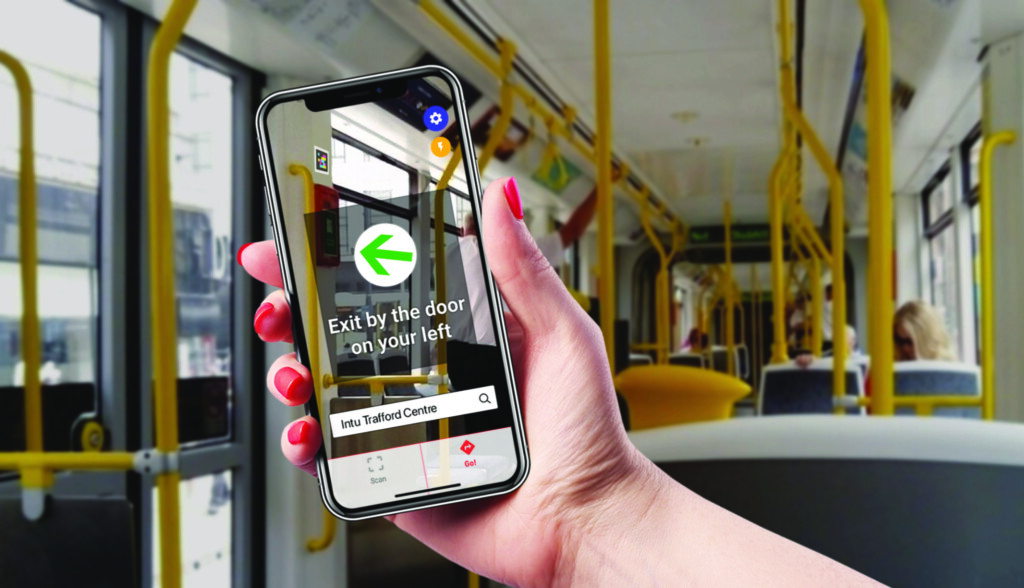Icomera Accessibility Solutions
Our Transport Accessibility solutions help passengers who need assistance while on the go. Delivering timely, accurate information to passengers via their smartphones, our services help those with hearing and sight loss to travel with confidence, allowing us to build transport systems that can be enjoyed by all.
The Value of Accessible Transport Systems
Modern, inclusive, and fully accessible transport systems should be stress-free to navigate for all people, regardless of age, medical factors, disabilities, or native language.
But consider this important question: Of the people who could be using passenger transport and, by extension, contributing to the economy by purchasing tickets and traveling for work or leisure, how many are actually able to do so?
24.6 million Americans aged 18 and older have self-reported travel-limiting disabilities, and less than half of these passengers are aged 65 and older. In the UK, more than 60% of users with accessibility needs do not attempt or struggle to make independent journeys on passenger transport.
Making travel experiences more accessible will improve journey satisfaction and overall quality of life for these passengers while reducing the estimated impact of inaccessible transport on the national economies, which runs into tens of billions of pounds, euros, and dollars per year.
The ergonomic design of stations and vehicles will, of course, play a significant role in improving the accessibility of passenger transport. However, alongside these major infrastructural changes, digital technologies which use personal smart devices will provide personalised and at-hand support, reducing the barriers to use for visual and hearing-impaired customers – and addressing some hidden needs of a broader audience as well.
These innovations provide cost-effective “quick wins” for transport operators and authorities due to the comparatively small amount of capital investment required to develop and deploy them, and the rapid speed with which this can be done.

Visor: Guided Navigation for Passengers with Sight Loss
Developed in association with the Royal National Institute of Blind People (RNIB) and NaviLens, Visor enables passengers with sight loss to receive relevant navigation assistance, in real-time, directly via their personal smart devices. In so doing, Visor is helping passengers who need assistance navigate the transport network with both independence and confidence.
By scanning brightly coloured ‘BIDI’ codes, a passenger’s phone can visually direct them to various points of interest within a station, their platform, and on their vehicle. The device automatically recognises any codes in view and displays location- and context-specific directions to help them reach their destinations more quickly and easily. BIDI codes offer many advantages over standard monochrome QR codes when it comes to assisting visually-impaired passengers on the move:
- Easier to spot and scan from a distance (up to 30 meters away)
- Registered 12x faster by a mobile device’s camera, even when they are out of focus or orientation
- Multiple codes can be scanned simultaneously
- Secure, locked-down environment compared to standard, open-source QR codes
Closed tests of Visor have revealed the following:
- 94% of users could locate elements they were previously unable to find
- 75% would classify it as a fully inclusive service
- 86% felt it would reflect positively on the transport operator if implemented
“Navigating busy train stations can be tricky for everyone and we all want to get from A to B as quickly as we can, but for people like myself, with a visual impairment, it can be even more of a challenge. [Visor] has allowed us to push the boundaries of technology to transform the passenger experience for everyone, through the lens of people with sight loss. Technology like this allows blind and partially sighted people to maintain a level of independence whilst proving that inclusive design is better for everyone.”
Marc Powell, Paralympic athlete and Strategic Accessibility Lead at RNIB
HEAR: Empowering Passengers with Hearing Loss
HEAR (Hearing Enhanced Audio Relay) enables passengers connected to a vehicle’s onboard Wi-Fi to receive personalised journey announcements to their smart devices in real-time.
With HEAR, when an announcement occurs, the passenger receives a text notification, and the audio begins playing automatically. The passenger controls the volume and can set notifications for their specific destination or opt to hear them all. A history of announcements is always available, which allows users who need more time or those who were distracted to go back and review.
Additionally, the notifications are multi-lingual, and can be changed in the user settings. A passenger can also set an advanced notice timer when more time is needed to alight. Leveraging personal devices in this way is a viable alternative to hearing loops, and it broadens the use case to include people who have a temporary limitation such as from an ear infection, or a self-imposed limitation, such as headphones.
Prior to trials of HEAR undertaken in the UK, a survey of people with hearing loss found:
- Only 7% were somewhat confident that they would be made aware of changes and disruptions during their journey
- Only 16% felt they were treated equally compared to people without hearing loss
- 96% of respondents would love to have a solution like HEAR implemented on passenger transport
Read our Transport Accessibility Guide…
CONTACT US FOR MORE INFORMATION ON ICOMERA ACCESSIBILITY SOLUTIONS